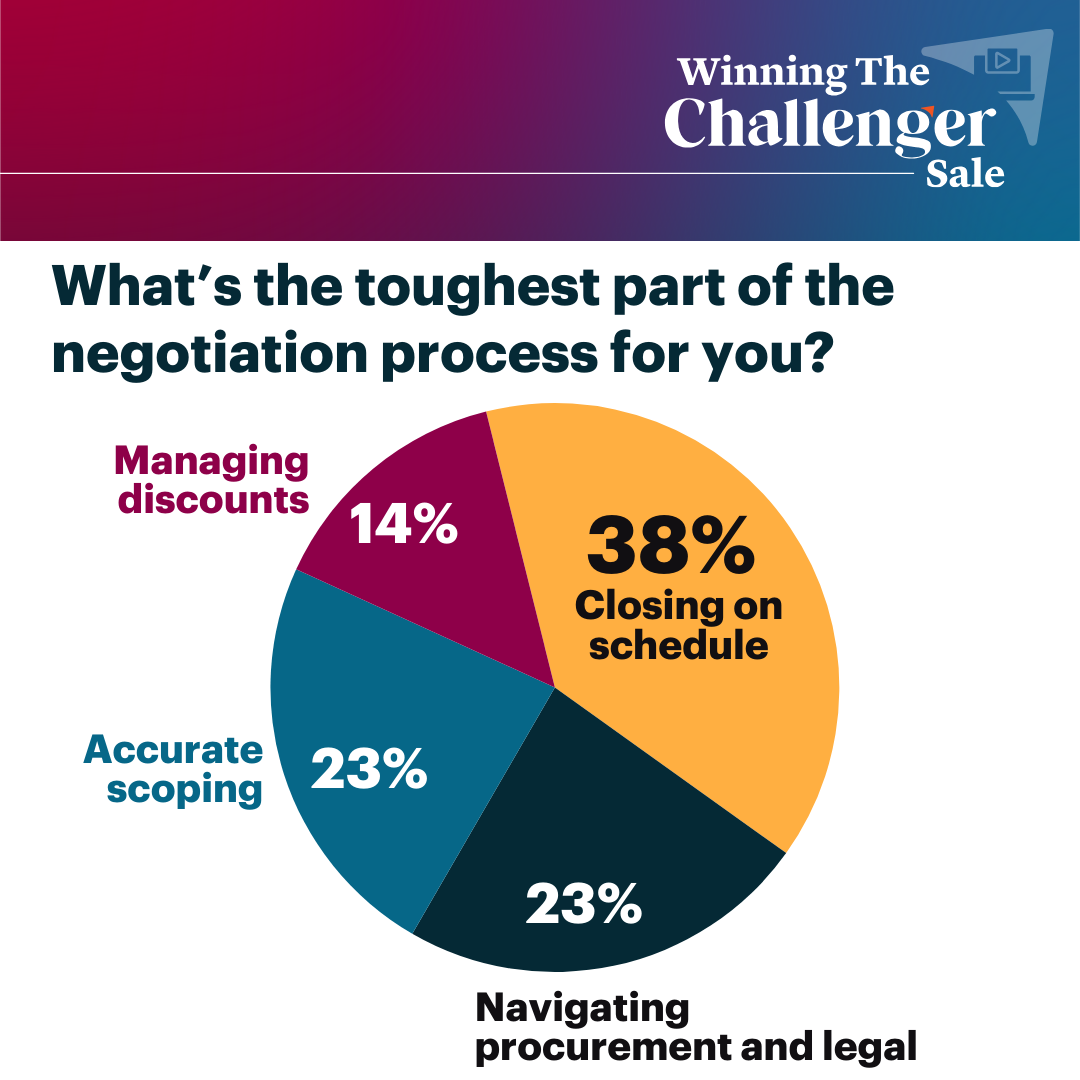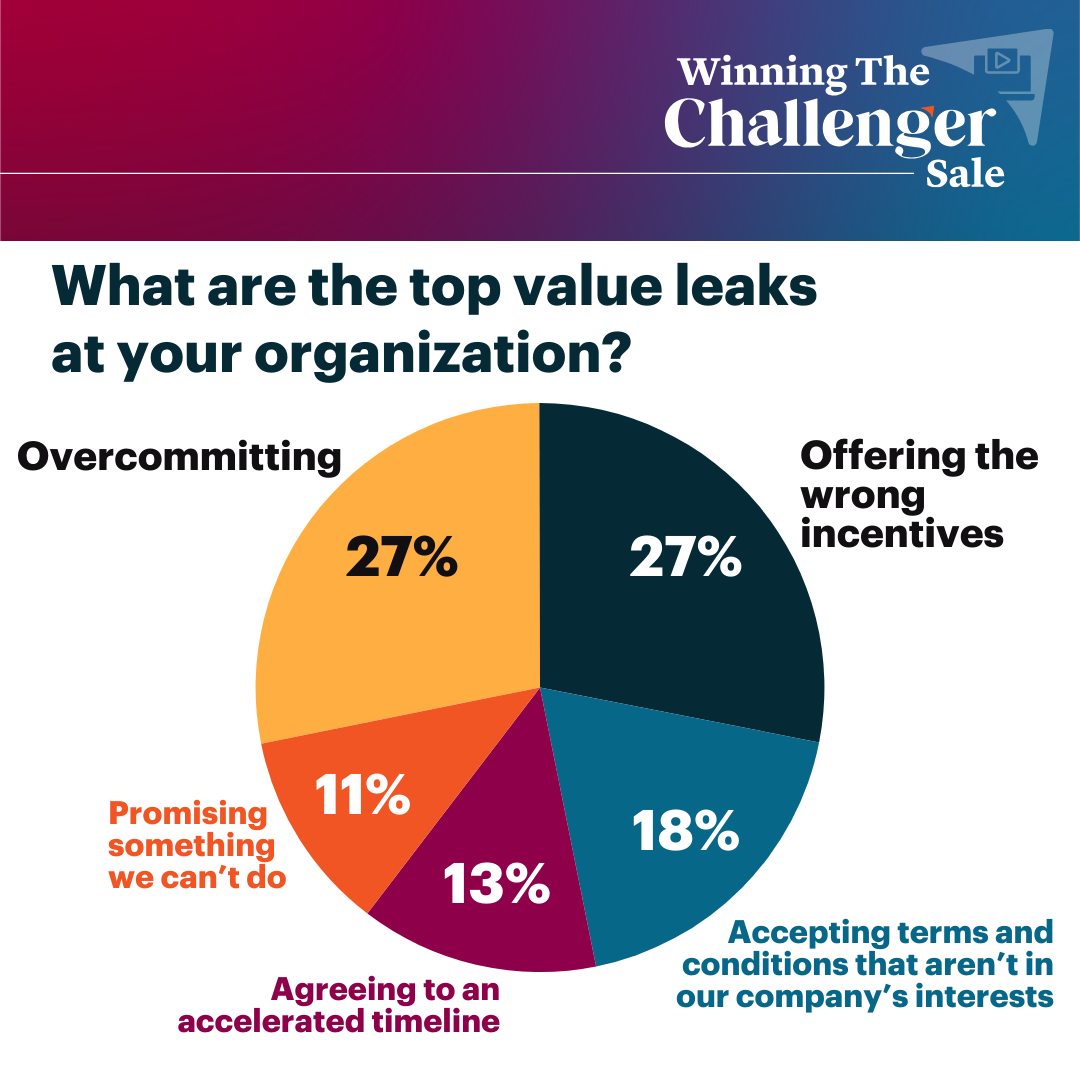There’s no win more satisfying — and no loss more frustrating — than one you’ve spent months negotiating. Sales leaders know that the desire to close a deal can push even experienced sellers toward bottom-line-undermining discounts, unkeepable product promises, or ballooning scopes. Even the sellers who avoid these tempting traps might struggle with procurement, legal, and their ever-expanding list of paperwork requirements.

During Q4, negotiations are top-of-mind for every sales team. But the groundwork for successful negotiations in sales is laid long before the contract is signed. When they nail it, your sellers can avoid discounts and, dare we say it, perhaps even have a little fun?
In this article, we’ll address how Challengers approach negotiations differently, with the negotiation tactics your sellers need to win.
The role of preparation in negotiation
Challengers never walk into a sales conversation without a Commercial Insight, and that level of preparedness helps them prepare for negotiations, too. For one thing, preparation builds the confidence sellers need to negotiate effectively.
In our recent webinar, Negotiating Like a Challenger, Challenger’s Geoff Hendricks expanded on this idea.
“Sellers don’t naturally want a discount because it takes us further away from our own personal goal. But why does it happen? There’s a moment of fear that can take place when you’re looking at needing to make quota. At the same time, you know you have a deal towards the end of the stage, and you don’t want it to slip away. Simon Sinek actually found that you can turn that fear or that nervousness into excitement with proper preparation, training, and practice, because they’re [coming from] the same area of your brain.”

It takes adequate preparation for sellers to prevent late-stage value leaks. That kind of preparation might require your sellers to outline customer needs and priorities earlier in the sales process, including identifying what’s negotiable and what isn’t.
Quantify like a Challenger
To avoid late-stage negotiation stumbles, Challengers do a couple things differently. First, they constantly quantify value — starting with delivering a true Commercial Insight and using that information to emphasize the cost of delay, according to John Shea, Global Director of Sales Enablement at Databricks.
“On a day-by-day basis, we could actually quantify the impact of not taking action on the problem and not getting it over the line,” John said. “The discount is not really that effective or scalable or defensible of an urgency driver, in my experience.”
This calculation, called the Cost of Inaction (COI), brings the thread of the Commercial Insight through to negotiations in order to build a more urgent case for change. As John said, “If you’re not quantifying, you’re not challenging.”
How do you calculate the COI? Use this simple formula, detailed by our Head of Learning Design Lauren Graves in this short clip.
Be prescriptive
Next, Challengers are prescriptive. The prescription doesn’t even need to be correct. High-performing sellers offer the solution they think buyers need based on all the information at hand and then sit back and listen. Confident Challengers also use prescription to create Constructive Tension. They ask, “Where did I go wrong here?” Sellers can use this opportunity to probe key priorities and adjust based on those corrections.
“Be prescriptive,” John said. “Invite skepticism. That’s what confident Challengers do.”
When they recognize that buyers have realized the need to disrupt the status quo, they pivot to offering a solution — what we often call “Sizing the Pie.” The information they’ve gleaned throughout the sales process helps them build leverage during this phase, since they know customers’ pain points and their negotiables.
Build rapport with the right stakeholders
Once procurement enters the chat, sellers’ attention to multithreading and ability to identify Mobilizers is put to the test.
“If you’ve got one champion, you’ve got a problem,” John told our webinar audience.
With buying groups spending so little time — less than 17% of their buying time, spread across vendors — it’s essential for sellers to equip their Mobilizers to sell on their behalf. That might involve seeking out technical champions within your customer’s organization, or ensuring your Mobilizer can answer technical questions when you aren’t in the room.
This goes hand-in-hand with anticipating customer objections later in the negotiation cycle. Sometimes, it’s as simple as writing down the ultimate goal of the sale and understanding what is worth sacrificing in pursuit of that win; likewise, high-performing negotiators also know when the answer is a hard “no.”
As Geoff explained, it comes down to establishing value early in the sales process. Building value-based relationships with internal stakeholders empowers them to advocate on your behalf when procurement steps in with demands.
“Being a third-party facilitator of decision-making between your customer’s organization and your organization is a really powerful position to put yourself in,” Geoff said.
What high performers do differently in sales negotiations
As you assess what your team needs to close deals and prevent value leaks, remember that Challengers win by creating a better sales experience from the very first call. Likewise, high-performing negotiators don’t win in the final mile. Instead, they sell in a way that makes for smoother negotiations. Here’s how the difference between core performing and high performing negotiators might play out…
Core-performing negotiators
- Bring a must-win attitude to the negotiation
- Anticipate customer objections
- Write out opening remarks
- Repeatedly mention advantages of the proposed solution
- Prepare to win a debate at the expense of the counterpart
High performing negotiators
- Know where you need to win and can afford to lose
- Retain a reputation for reasonableness
- Anticipate customer objectives
- Write out ultimate goals
- Negotiate dealbreakers first, rather than easy items first
- Never stop looking for more opportunities to create value
Small changes early in the sales process can help transform core performing negotiators (and sellers) into value-protecting high performers. That’s good news for your bottom line and for the sales experience, which Challengers know is the key ingredient for longstanding customer loyalty.
For more on negotiations, don’t miss the full replay of our on-demand webinar, “Negotiating Like a Challenger,” and tune into Winning The Challenger Sale each month as we dive deep into Challenger methodology with expert guests.
Challenger, Inc.
Challenger is the global leader in training, technology, and consulting to win today’s complex sale. Our sales transformation and training programs are supported by ongoing research and backed by our best-selling books, The Challenger Sale, The Challenger Customer, and The Effortless Experience.
More from our blog
AI Isn’t the Advantage—Human Brilliance Is
There’s a growing belief in B2B sales that AI is the answer to everything. New tools, new promises, and new automation appear almost daily—each…
AI Can Power the Sale—But Human Sellers Still Win the Moments That Matter
Artificial intelligence is rapidly changing how B2B sales organizations operate. From account targeting to outreach optimization, AI is helping…
3 Challenger Skills That Boost Sales Rep Productivity and Motivate Buyers
Sales leaders everywhere are looking for ways to improve sales rep productivity. But productivity isn’t just about efficiency—it’s about…
What are you waiting for?
Transform your sales team.
The best companies grow, and grow fast, by challenging customers, not by serving them.




